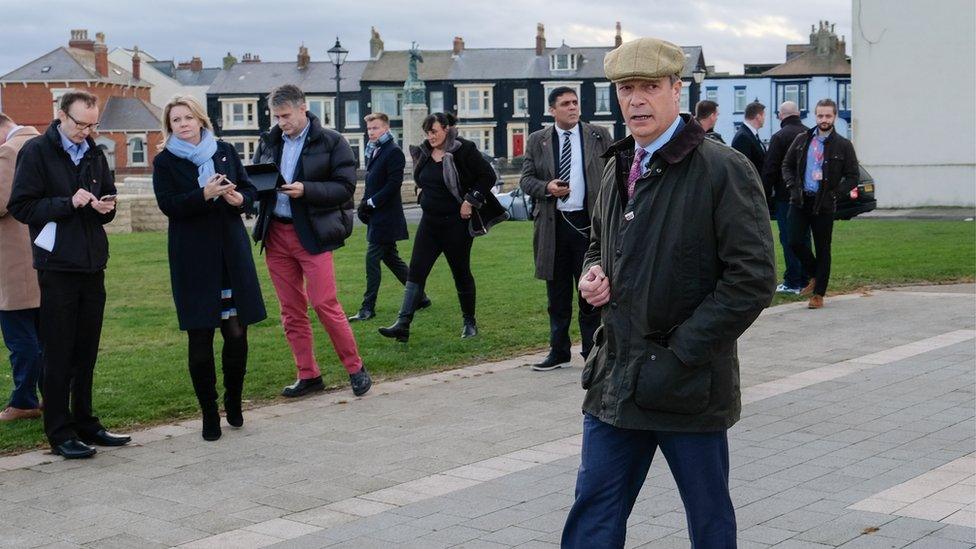General election 2019: Brexit Party will not stand in Tory seats
- Published
- comments
Farage: "The Brexit Party will not contest 317 seats"
Nigel Farage has ditched plans to take on the Tories in more than 300 seats, after what he said was Boris Johnson's "shift of position" on Brexit.
The Brexit Party leader had planned to run candidates in 600 seats after Mr Johnson rejected his offer of a "Leave alliance" to deliver Brexit.
But he has been under pressure not to split the pro-Brexit vote.
The party will not now stand in 317 seats won by the Tories in 2017, but will continue to stand elsewhere.
Mr Farage said his party would focus its efforts on trying to take seats held by Labour, whom he accused of "betraying" its Leave-supporting voters.
The BBC's Alex Forsyth said some Brexit Party candidates had expressed concern about Mr Farage's plan to stand against the Tories in 600 constituencies, fearing it could hand an election victory to Labour and lead to another EU referendum.
The Brexit Party is less than a year old and does not have any MPs - but it was the clear winner in the UK's European elections in May, with more than 30% of the vote.
Mr Johnson welcomed Mr Farage's move, calling it "a recognition that there's only one way to get Brexit done, and that's to vote for the Conservatives".
Labour leader Jeremy Corbyn said Donald Trump "got his wish" when Mr Farage announced his electoral strategy.
He said the Brexit Party leader was offering a "Trump alliance" that would lead to "Thatcherism on steroids" and threaten the future of the NHS.
The US president had previously urged Mr Farage to team up with Boris Johnson, saying they would be "an unstoppable force".
Liberal Democrat deputy leader Sir Ed Davey said Mr Farage's decision "shows the Conservatives and the Brexit Party are now one and the same".

Mr Farage made the announcement in Labour-held Hartlepool - a top target for his party
Explaining his U-turn to supporters in Hartlepool, Mr Farage said Boris Johnson had recently signalled a "big shift of position" in his approach to Brexit.
He cited a pledge by the PM not to extend the transition period that would follow the UK's departure from the EU under the terms of his Brexit deal.
The period would see the UK stick to the EU rules on issues such as freedom of movement until December 2020.
Mr Farage also said he was encouraged by recent commitments from Mr Johnson to seek further divergence from EU rules in a post-Brexit trade deal.
He added that this was a "huge change" from the kind of trade pact that had been planned under former PM Theresa May.
'Let Brexiteers down'
Mr Farage's decision prompted dismay among some Brexit Party candidates who had been hoping to stand in Tory-held seats next month.
Neil Greaves, who had been due to stand for the party in the Essex seat of Harlow, told the PA news agency that Mr Farage had "let Brexiteers down".
He said he planned to continue to stand in the constituency as an independent pro-Brexit candidate, and urged fellow former candidates to do the same.
The party's candidate in Mansfield tweeted, external that the move meant the "opportunity to stand up for democracy" had been "snatched away" from candidates.
Mr Farage had previously offered to not stand candidates against the Tories in certain seats if the prime minister changed aspects of his Brexit deal.
But the proposal was rejected by Boris Johnson, who said deals with "any other party" would "risk putting Jeremy Corbyn into No 10".
Mr Farage said he had "genuinely tried" to forge a so-called "Leave alliance" with the Tories, but his efforts had gone nowhere.
"In a sense we now have a Leave alliance, it's just that we've done it unilaterally," he added.
Mr Farage has already confirmed he will not be standing himself in the election, saying he wanted to concentrate on helping his party's candidates.


Hypothetically, the decision by the Brexit Party leader makes it notionally easier for the Tories to keep seats they hold already.
But it's a million miles away from giving them a clear run.
Mr Farage says he will still stand candidates in Labour areas.
And for the prime minister to get the majority he craves, the Tories have to take seats that are currently held by Labour, not just hold on their existing MPs.

Pro-Remain election pact
Scottish National Party leader Nicola Sturgeon said the Conservatives have "effectively become the Brexit Party".
She added that defeating the Tories in Scotland "will help deprive Boris Johnson's increasingly extreme and right-wing party of the majority they crave".
Anti-Brexit parties Plaid Cymru, the Green Party and the Liberal Democrats have agreed not to stand against each other in 60 seats across England and Wales.
Their pact means that, in Wales, two of the parties will agree not to field a candidate, boosting the third candidate's chances of picking up the Remain vote.
In England, it will simply be a two-way agreement between the Lib Dems and the Greens.